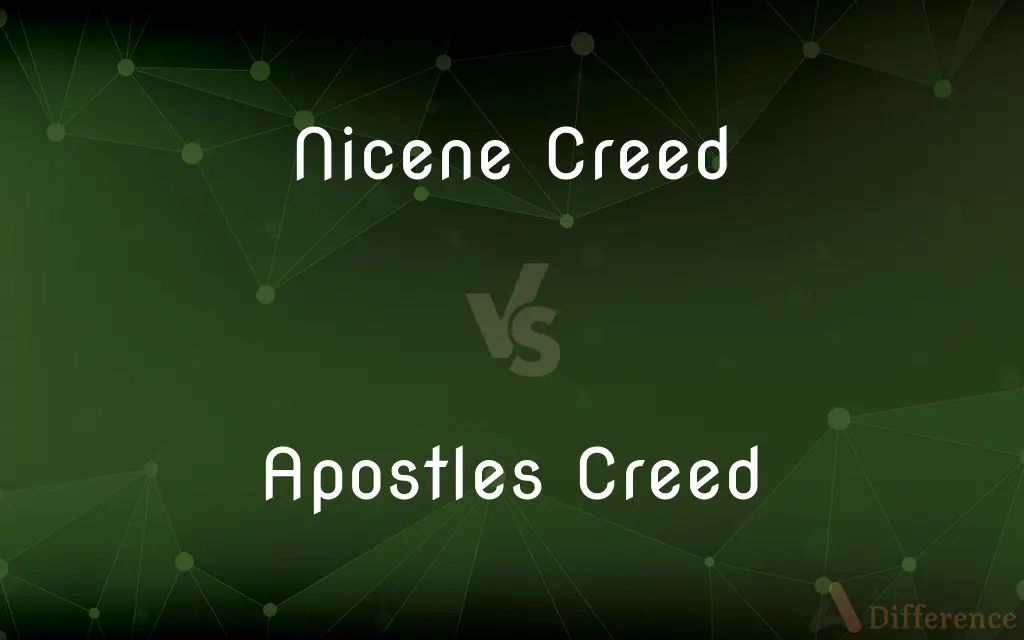Nicene Creed vs. Apostles Creed — What's the Difference?
By Tayyaba Rehman & Fiza Rafique — Published on February 9, 2024
The Nicene Creed, established in the 4th century, defines the fundamental Christian beliefs, especially Christ's divinity. The Apostles' Creed, older and simpler, is a summary of Christian beliefs, used in baptism.

Difference Between Nicene Creed and Apostles Creed
Table of Contents
ADVERTISEMENT
Key Differences
The Nicene Creed was formulated at the First Council of Nicaea in 325 AD to address controversies about the divinity of Christ and the Holy Spirit. It represents a unified Christian doctrine. In contrast, the Apostles' Creed is thought to have been developed earlier, reflecting the faith of the Apostles and used as a baptismal confession in the early Church. It is shorter and considered to be a foundation of Christian belief.
The Nicene Creed serves as a definitive statement of faith, recited in many Christian liturgies to affirm the theological stance of the Church, particularly concerning the nature of the Trinity and Christ's divinity. The Apostles' Creed, while also used in worship, is particularly associated with the rites of Baptism and is seen as a personal profession of faith, used in many Western Christian denominations.
The Nicene Creed provides a detailed theological statement, emphasizing the nature of Christ's relationship to God the Father, the role of the Holy Spirit, and the concept of the Trinity. The Apostles' Creed is less detailed and more focused on the life and ministry of Jesus, the forgiveness of sins, and the believer's hope for eternal life.
The Nicene Creed is widely used across various denominations, including Roman Catholic, Eastern Orthodox, Anglican, and many Protestant churches, signifying a common ground of core Christian beliefs. The Apostles' Creed is predominantly used in Western Christian denominations and is particularly favored in Lutheran, Anglican, and other Protestant churches for its simplicity and directness.
The Nicene Creed has undergone slight revisions and has different versions, such as the Niceno-Constantinopolitan Creed of 381 AD. The Apostles' Creed has remained relatively unchanged, symbolizing a direct link to the faith of the early Christian community and serving as a concise summary of Christian doctrine.
ADVERTISEMENT
Comparison Chart
Origin
Formulated at the First Council of Nicaea, 325 AD.
Developed earlier, reflecting the faith of the Apostles.
Primary Purpose
To define and unify the Christian doctrine, especially the Trinity and Christ's divinity.
A baptismal confession and a personal profession of faith.
Theological Detail
Detailed, addressing the nature of the Trinity and Christ's divinity.
Less detailed, focusing on the life and ministry of Jesus.
Usage in Denominations
Used widely in Roman Catholic, Eastern Orthodox, Anglican, and many Protestant churches.
Predominantly used in Western Christian denominations.
Evolution & Adaptations
Undergone revisions, with different versions like the Niceno-Constantinopolitan Creed.
Remained relatively unchanged, maintaining a direct link to early Christian faith.
Compare with Definitions
Nicene Creed
The Nicene Creed serves as a theological cornerstone for numerous Christian communities.
The words of the Nicene Creed resonate in churches worldwide, symbolizing a unified Christian doctrine.
Apostles Creed
The Apostles' Creed serves as a personal profession of faith for many Christians.
At the prayer meeting, each member recited the Apostles' Creed, affirming their individual faith journeys.
Nicene Creed
The Nicene Creed connects contemporary Christian worship with the historical Church.
Reciting the Nicene Creed, believers feel a sense of connection with centuries of Christian tradition.
Apostles Creed
The Apostles' Creed succinctly summarizes the core tenets of Christian faith.
In her daily prayers, she included the Apostles' Creed, reaffirming her commitment to the Christian teachings.
Nicene Creed
The Nicene Creed was established to address theological controversies in the early Church.
The Nicene Creed played a crucial role in unifying the Church's stance on the nature of Christ and the Holy Spirit.
Apostles Creed
The Apostles' Creed connects believers to the faith of the early Christian community.
Reciting the Apostles' Creed, the congregation felt a bond with the earliest followers of Christ.
Nicene Creed
The Nicene Creed is central to the liturgy in many Christian denominations.
During the mass, the Nicene Creed was recited, echoing the foundational beliefs of the Christian faith.
Apostles Creed
The Apostles' Creed is an early statement of Christian belief, used primarily in baptism and worship.
The new converts recited the Apostles' Creed, declaring their faith during the baptism ceremony.
Nicene Creed
The Nicene Creed is a statement of Christian faith that affirms the doctrine of the Trinity and Christ's divinity.
In Sunday's service, the congregation stood to recite the Nicene Creed, affirming their shared beliefs.
Apostles Creed
The Apostles' Creed is especially prominent in Western Christian traditions.
The Apostles' Creed is a fundamental part of the liturgy in many Protestant and Roman Catholic churches.
Common Curiosities
Can both creeds be used in the same religious service?
Yes, both creeds can be used in the same service, but it depends on the liturgical tradition and the specific occasion.
How do the Nicene Creed and Apostles' Creed differ in origin?
The Nicene Creed was formulated at the Council of Nicaea to address specific theological controversies, while the Apostles' Creed evolved earlier, reflecting the foundational beliefs of the Apostles.
What is the main purpose of the Nicene Creed?
The Nicene Creed aims to unify and define Christian doctrine, particularly concerning the nature of the Trinity and Christ's divinity.
Does the Apostles' Creed have different versions?
While largely unchanged, there are minor variations in wording among different Christian traditions.
Why is the Apostles' Creed important in Christian worship?
The Apostles' Creed serves as a personal profession of faith and is commonly used in baptismal rites and worship services.
What is the significance of the Nicene Creed's focus on the Trinity?
The Nicene Creed's emphasis on the Trinity addresses early Church controversies and provides a clear doctrinal stance on the nature of God.
Do all Christian denominations use the Nicene Creed?
The Nicene Creed is widely used, but its usage varies among denominations, with some preferring the Apostles' Creed or other statements of faith.
How does the Apostles' Creed's simplicity benefit its use in worship?
Its simplicity makes it accessible and easily memorized, allowing believers to affirm their faith straightforwardly.
Are the Nicene Creed and Apostles' Creed interchangeable?
While they share common beliefs, they serve different purposes and are not strictly interchangeable.
Is the Apostles' Creed used outside of baptism?
Yes, the Apostles' Creed is also used in daily prayers, worship services, and other religious ceremonies.
Why is the Nicene Creed recited in many liturgies today?
It's recited to affirm the congregation's collective faith and to maintain a connection with historical Christian doctrine.
Can the creeds be used in personal prayer?
Yes, many believers incorporate the creeds into their personal prayer life as a reaffirmation of faith.
How do the creeds reflect the historical development of Christian doctrine?
Both creeds encapsulate key theological debates and resolutions from the early centuries of Christianity, reflecting the development of doctrine.
How do the creeds contribute to Christian unity?
They provide a common ground of belief, connecting diverse Christian traditions through shared foundational doctrines.
Are the creeds relevant to contemporary Christian life?
Absolutely, they continue to provide a framework for understanding and professing the Christian faith in modern contexts.
Share Your Discovery

Previous Comparison
Sensors vs. Actuators
Next Comparison
Neurophysician vs. NeurosurgeryAuthor Spotlight
Written by
Tayyaba RehmanTayyaba Rehman is a distinguished writer, currently serving as a primary contributor to askdifference.com. As a researcher in semantics and etymology, Tayyaba's passion for the complexity of languages and their distinctions has found a perfect home on the platform. Tayyaba delves into the intricacies of language, distinguishing between commonly confused words and phrases, thereby providing clarity for readers worldwide.
Co-written by
Fiza RafiqueFiza Rafique is a skilled content writer at AskDifference.com, where she meticulously refines and enhances written pieces. Drawing from her vast editorial expertise, Fiza ensures clarity, accuracy, and precision in every article. Passionate about language, she continually seeks to elevate the quality of content for readers worldwide.
















































